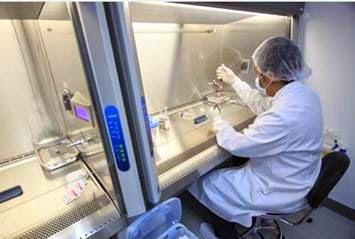One great fear I have is my baby being sick. What if something goes wrong while she is in my tummy? What if she inherits my mom's asthma. What if she'll be prone to cancer or diabetes because it runs in the family? Could I be doing something that can cause problems with her brain functions?
Thank God we were given a healthy little girl. I cannot say the same for a lot of other moms and I feel for them. I know I cannot compare their pain with mine but I see where they're coming from. Mila's colds from last week kept us worrying endless. We were thinking of worst case scenario. I know it's not without reason. Have you seen the news lately? There's just too much diseases that can be fatal to children and adults alike.
It's always different when it's your child who gets sick. Some kids may be born with deficiencies. Almost everyone get sick regardless of the care they get. I CANNOT stress out on things I cannot control. I need to focus on what I CAN. Our hopes is to keep them away from harmful, fatal diseases. If they get sick, I want to know how I can manage it and get my baby healthy again.
One of the things I read about is Cord Blood Banking. According to BabyCenter's Banking your baby's cord blood: An overview, "Cord blood banking involves collecting blood left in your newborn's umbilical cord and placenta and storing it for future medical use. Cord blood contains potentially lifesaving cells called stem cells. "
Stem Cells are the base of all other cells that later on develop or specialize into different organs and functions of our body. Getting stem cells from cord blood and storing it means having that undeveloped cell available to be cultured to function based on what is needed to help with the treatment of multiple diseases such as Leukemia and other cancers, blood diseases, and auto-immune disorders.

Read further for some notes from CORDLIFE PHILIPPINES on how your baby’s precious CORD blood can save his precious life
Quezon City, September 17, 2014 – As mothers, you will do anything for your child. Even way before they are brought into this world, your instincts kick in and you tirelessly worry about your baby. You want to learn everything there is to learn and more importantly, you want to protect them from anything and everything that can harm them be it the common cold or a fever; and if you had your way, you would gladly get sick for your child. And your anxiety is not without reason, since there are many childhood diseases that can be harmful or even fatal to children.
Leukemia is perhaps the most common type of cancer compromising 47.8% of all childhood cancers1. Hodgkin’s Disease1 or non-Hodgkin Lymphoma is the third childhood cancer comprising 9% of childhood cancer. Aside from these types of cancers, certain brain disorders are also common in children. These include cerebral palsy and neuroblastoma. Cerebral palsy severely impairs the development of the motor functions and afflicts 1-2 percent of the Philippine population2. Neuroblastoma, on the other hand, causes the sufferer to lose the ability to empty the bladder, experience paralysis of the hips, feet, legs and uncontrolled movement.
Research into the use of cord blood and cord lining stem cells have been ongoing since the 1980s and has shown promise of saving lives and treating life-threatening diseases. More than 30,000 cord blood stem cell transplants3 have already been performed since 1988.
“The strides made in cord blood transplantation has made this manner of treating diseases more widely accepted by people,” said Dr. Arvin Faundo, Cordlife Philippines Medical Director.
“Currently, umbilical cord blood transplant is considered as one of the standard forms of treatments for leukemia, among others. Also, many clinical trials worldwide are ongoing for which the results are encouraging. In fact, Duke Medicine is studying the use of umbilical cord blood stem cells6 to treat autism and related brain disorders. While the trials are still in the initial phases, we are hopeful that these will yield positive results.”
Last June, Duke Medicine received USD 15 million funding by Atlanta-based Marcus Foundation. Apart from treating patients based in the United States, Duke Medicine has also opened its door for possible participants from outside of the country provided they meet the inclusion and exclusion criteria7 to be considered, patients must be aged between 24 months and 72 months old. The patient would also need to travel at least three times to Duke Medicine in the United States – at the infusion, the six- and 12-month follow up stages. A stipend worth U$1,000 will likewise be provided to the trial participant per trip to help defray travel expenses.
When popular reporter, Niña Corpuz, decided to bank with Cordlife, she knew it was an investment in her baby’s and her family’s future. Like any mom, Niña wants to give her baby the best that life has to offer and her baby’s long-term health and well-being was the primary reason for her to consider banking her baby’s cord blood and cord lining.
“Having my child was the most fulfilling moment of my life. I never thought I’d be capable of so much love and sacrifice until I gave birth to my wonderful kids.” said Corpuz. “Every day is just a joy and as early as now, I think of the many things my child and I will do, experience, and share. I invested in my baby’s cord blood and cord lining because I want to be sure that my baby is given the best investment I could ever give.”
Today, Cordlife has served over 3,000 families in the Philippines alone and is trusted by 100,000 parents8 worldwide.
“We are definitely seeing a growing acceptance and openness of the Filipino market to the idea of umbilical cord lining and cord blood banking because I believe that the parents are now more proactive in finding better means to complete their family’s health protection plan.” said Michael Arnonobal, Cordlife Philippines Managing Director. “More importantly, today’s mothers see investing in their children and families as paramount to ensuring their legacy and their well-being.”
I must admit we missed this chance for Mila. We were not prepared. This is one of the things I have noted for our next baby. Cord Blood Banking is the best insurance we can get for our baby and we only want the best for them.
For more information, download Cordlife’s free infopack @ www.cordlife.ph or call (02) 3321888 to know how you can invest in your children’s future.

